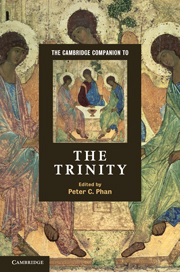Book contents
- Frontmatter
- Contents
- Notes on contributors
- Preface
- Part I Introduction
- Part II Retrieving the sources
- Part III Renewing the tradition
- 6 God as the mystery of sharing and shared love: Thomas Aquinas on the Trinity
- 7 The Trinity in Bonaventure
- 8 The Trinity in the Protestant Reformation: continuity within discontinuity
- 9 Between history and speculation: Christian trinitarian thinking after the Reformation
- Part IV Contemporary theologians
- Part V In dialogue with other religions
- Part VI Systematic connections
- Index
- References
8 - The Trinity in the Protestant Reformation: continuity within discontinuity
from Part III - Renewing the tradition
Published online by Cambridge University Press: 28 July 2011
- Frontmatter
- Contents
- Notes on contributors
- Preface
- Part I Introduction
- Part II Retrieving the sources
- Part III Renewing the tradition
- 6 God as the mystery of sharing and shared love: Thomas Aquinas on the Trinity
- 7 The Trinity in Bonaventure
- 8 The Trinity in the Protestant Reformation: continuity within discontinuity
- 9 Between history and speculation: Christian trinitarian thinking after the Reformation
- Part IV Contemporary theologians
- Part V In dialogue with other religions
- Part VI Systematic connections
- Index
- References
Summary
the bible as the “exclusive” source of revelation and the “only” authority
The sixteenth-century Protestant Reformation, which is considered by many to be one of the most important events in the history of Christianity, was much indebted to the Renaissance. There is a wisecrack that Erasmus laid the egg and Luther hatched it. In the view of many of the most ardent Reformers, this humorous saying, however, may be an overstatement. There is a sizable consensus that the Reformation was connected to the Renaissance only to the extent that it restricted the Renaissance's call to return to the ancient sources (ad fontes) to an acceptance of the Bible as the exclusive source of faith (sola scriptura). This principle solidified the normative authority of the Bible for all things theological and liturgical in the life of the church. The power of the Word was directly related to the power of the message of the Bible. According to the Reformers, the gospel message had to be emancipated from the oppressive authority of the Roman Catholic Church and its tradition, and thereby was set free to work directly on human hearts.
- Type
- Chapter
- Information
- The Cambridge Companion to the Trinity , pp. 128 - 148Publisher: Cambridge University PressPrint publication year: 2011
References
- 1
- Cited by



